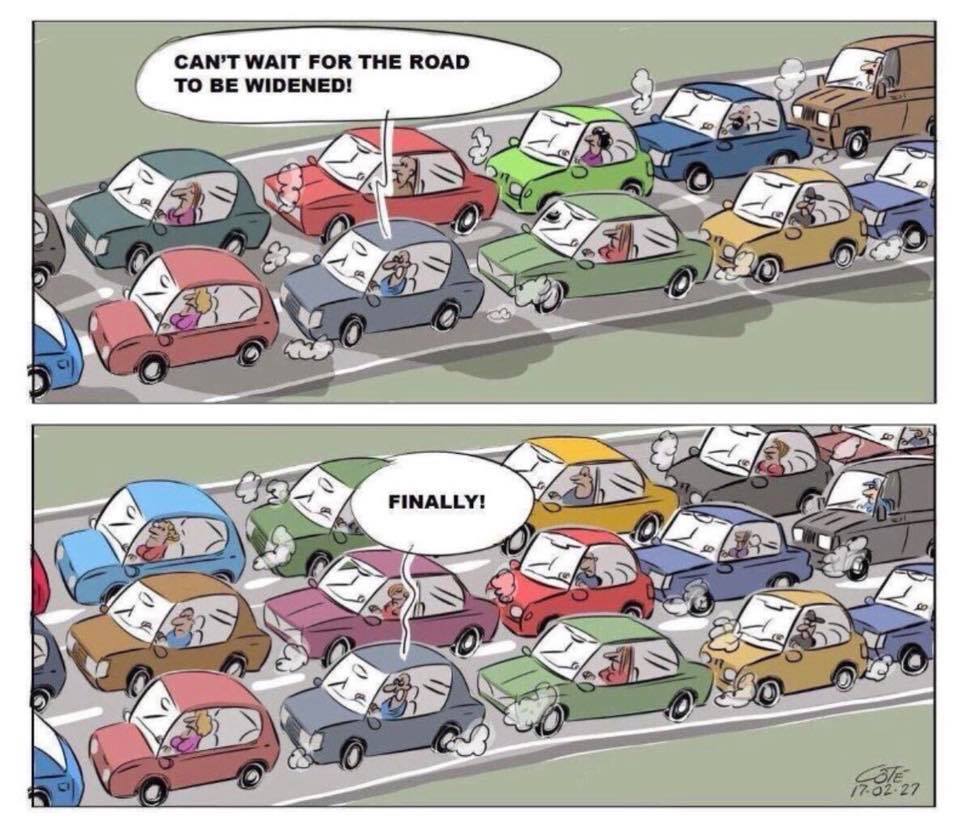2 Reasons Why the American Approach to Congestion is Totally Wrong
“The real question is: how do we want our congestion? Do we want it in two lanes, four lanes, or eight lanes?”
The above quote is the cheeky yet spot-on way Strong Towns President, Chuck Marohn, has described the issue of congestion. He also likes Lewis Mumford's saying: "Curing congestion by adding more lanes is like curing obesity by buying bigger pants.”
We use these phrases because we’re trying to explain a “problem” that has been so poorly explained and understood it’s led our nation to spend billions on pointless road projects. (Just take a look at this proposed road expansion in Shreveport, Louisiana for a taste.)
Today I want to share two key reasons why the conversation on congestion is so misguided and why the proposed solution is no solution at all.
1. Congestion isn’t a problem.
At least, not in the way you think. Yes, congestion is a “problem” if you’re leaving the office at 5:30pm in your personal vehicle hoping to make it to your home 10 miles away on the edge of town in 15 minutes or less. But congestion is not the cause of your delay, or your lost income and productivity.
Congestion is a phenomenon we’ve created as a result of our hierarchical road network. Chuck explained this skillfully in a post a few years ago so I won’t repeat his work, but to summarize: When you create a road system where small neighborhood streets feed into large arterial roads, which feed into major highways, you shouldn’t be surprised if the result is a large amount of cars all crowding those arterials and highways during peak hours. We've created this situation by the very design of our road networks, and only a fundamental rethinking of the way we build and move around our cities can change it.
Picture the most economically prosperous, thriving cities: New York, Chicago, London, Paris… These are also some of the most congested cities on earth. So congestion does not drain local economies. Quite the opposite. These places are congested because they are full of people, businesses, visitors, and economic activity.
John Norquist, author, former mayor and former CEO of the Congress for the New Urbanism, writes for CityLab:
Congestion, in the urban context, is often a symptom of success. […] Moving vehicular traffic is obviously a necessary function, but by making it the only goal, cities lose out on the economic potential created by the crowds of people that bring life to a city.
2. Road expansion isn’t a solution.
So we’ve created the problem of congestion. But we can build our way out, right? Nope. Because of a concept called “induced demand” most highway expansion projects are basically the equivalent of flushing public dollars down the toilet. When you expand a road, you simply encourage more people to drive, thus filling up the newly added lanes. This phenomenon has been studied and documented in towns and cities around the country. Check out this new report by the U.S. PIRG Education Fund and Frontier Group, which details several wasteful highway expansion projects nationwide if you'd like to learn more.
The solution to the manufactured “problem” of congestion is to build complete neighborhoods where the necessities of daily life are located close together and we don’t have to drive 10 miles to get to work and 5 miles to get to the grocery store and 7 miles to pick up our kids at school. If that sounds tough or even impossible, fear not; our ancestors have been developing compact neighborhoods in this manner for centuries.
As Chuck Marohn wrote in his essay, “Dealing with Congestion”:
Instead of building lanes, we need to be building corner stores. We need local economic ecosystems that create jobs, opportunity and destinations for people as an alternative to those they can only get to by driving.
So next time you start getting frustrated in a traffic jam at 8am, remember: We've created this situation by the way we've designed our roads and our communities. Expanding highways won't solve the problem, but building complete communities and strong towns will.
Want more fresh content? Get the latest from Strong Towns right to your inbox.
(Cartoon by André-Philippe Côté)


Rachel Quednau serves as Program Director at Strong Towns. Trained in dialogue facilitation and mediation, she is devoted to building understanding across lines of difference. Previously, Rachel worked for several organizations fighting to end homelessness and promote safe, affordable housing at the federal and local levels. Rachel also served as Content Manager for Strong Towns from 2015-2018. A native Minnesotan and honorary Wisconsinite, Rachel received a Masters in Religion, Ethics, and Politics from Harvard Divinity School and a Certificate in Conflict Transformation from the Boston Theological Interreligious Consortium, both in 2020. She currently lives in Milwaukee, Wisconsin, with her husband and young son. One of her favorite ways to get to know a new city is by going for a walk in it.